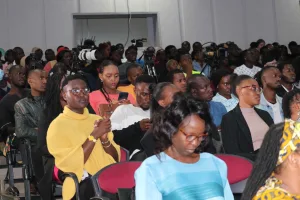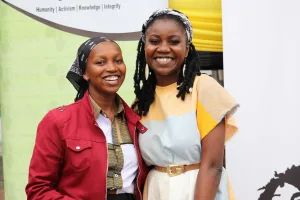
By Kemunto Ogutu
Sharon Liboi’s high pitched voice rang out grabbing the attention of the audience in the fully-packed Louis Leakey Auditorium at the Naional Museums of Kenya. Diplomats, judges, activists, young and old, a perfect audience of state and street, went silent, eyes fixated on the song whisperer on stage. They are meeting to celebrate the International Day of Democracy 2023, and the youthful singer on stage serves them a hot, almost disturbing opener.
In the ever-evolving landscape of modern music and poetry, young Kenyan artists are boldly taking center stage to inspire change and promote democracy across the globe. And they are starting from home-Kenya.
As an African contemporary music artist, Sharon Liboi glories in using her voice to advocate for social change and democracy in the world. She proudly refers to herself as an artivist, a term coined from combining the words art and activism, and referring to anyone who uses art to promote political or social change.
During the interview after the performance, Liboi explained that her love for artivism was kindled early in her teenage years. She explained that from her earliest days, she was acutely aware of a disconcerting truth – that mainstream media too often told their stories with a tinge of bias.
“I wanted to tell my stories the best way I could to change my environment, and to change my life,” she explained.
Although she loves her cause as an artivist, the young artist confesses that it has not been without challenges.
“When you are talking about things that people do not talk about openly, it is very hard to be accepted and even get spaces to talk about them because at times people fear saying the truth, but as an artist, I feel like it’s my purpose to do that,” she said
Her canvas, she attests, is painted with the bold strokes of social justice, the vibrant hues of mental health, and the rich tapestry of African culture. Her goal is to change one mind at a time.
Liboi urges the youth across the world to use their artistic talents to spark change in their communities. She believes that art can and does spark conversations that could influence policies across the globe.
As Liboi sings her lungs out on stage, Evans Komora fills the interludes between her verses and choruses with his gifted guitar skills.
For the past five years, Komora has been using his voice and guitar to sensitize the world on pertinent issues. From climate change to democracy and human rights activism, he is dedicated to using his talent “to make the world a better place.”
He explained that the greatest highlight of his work is seeing people understand what their rights are as he performs on stage.
“Art reaches people much more quickly since they can learn about things even when relaxing,” he added.
Komora urges the youth to use their talents and make sure their voices are heard. He said: “Talents are very crucial in the world of artivism.”
Komora, who is a proud environmental artivist shared that one of his causes is his fight against plastic pollution. Through his music, he challenges his audience to conserve the environment and avoid pollution.
“My hope is to see change in the world that results from my art. If my music would stop even one person from littering, then it would have served its purpose,” he said.

Spoken Word
Nyash, a young Kenyan poet has grown to be a household name among members of her trade. Her electrifying performances and bold poems resounding in halls attest to her passion for social justice and democracy.
Although her poetry journey began in high school, Nyash explains that it was not until she joined university that she began writing and performing poems that spoke of the ills in society.
“There is a lot of protection that you receive when you are within the four walls of an institution or a school,” she said. “When you come outside, you realize that what people talk about in social media and the news is actually true. So you find out that people go through so much.”
Like Liboi, Nyash believes that she is a voice for many people who cannot speak about what they are going through. “Art should be placed on a pedestal. It is art that gives a voice to the voiceless,” she said. She counts her greatest achievement the impact that her work has had in reaching and changing her audience’ perspectives.
Some of her work valiantly calls out rogue government institutions, religious leaders, and educational institutions that often oppress vulnerable citizens they are meant to serve and protect. Nyash is currently working on her new album that will address issues of social injustices surrounding women, youth, and the common citizen.
Hanna Carlsson, the first secretary for Human Rights and Democracy at the Embassy of Sweden in Nairobi reiterated that the youth are essential in the upholding of democracy in countries across the world.
Carlsson explained that involving the youth in democratic issues is everyone’s responsibility. She added that families need to involve their children in some decision-making from an early age to promote their abilities to make decisions and instill a sense of democracy in them. The diplomat-cum-human rights defender parents and educational institutions have a responsibility of helping young people to critically consume the information they see on social media.
“When they see or hear something on social media, they need to ask themselves, is this really right? Are the numbers or the claims I am seeing real facts?” She offered.
Democracy Under Siege
Speaking during the (International Day of Democracy 2023) commemoration event by ForumCiv, Hussein Khalid, the Executive Director of Haki human rights organisation, lamented the recent wave of military coups across Africa, saying they frustrate democracy a great deal. “In Africa, we have seen democracy being tested. Whether in Niger or in Gabon, military coups have taken precedence over the elections and nominations of leaders.”
He emphasized promotion of democracy as a role that everyone, and not just civil societies, should play. Khalid appealed to the youth and emphasized their need to stand firm and demand to be included in the decision-making processes in the country and the continent.
Representing Kenya’s Chief Justice Martha Koome, Lady Justice Fatuma Sichale urged Kenyans across the country to play their essential roles in safeguarding the country’s democracy. “When democracy works well, it does not just create policies,” she said. “It creates environments where happiness thrives, where individuals, including the youth, feel valued and are heard, and where dreams are not just dreamt but are actually realized.”
She noted that Africa and the world is currently facing democratic regression. Democratic regression, she explained, has manifested itself in the continent through the rise of incidents of coup d’états, and the weakening of the independence of institutions that are to serve as horizontal checks and balances of the exercise of public power. All these, coupled with the increased incidents of abuse of public rights, are manifestations that the institutions of governance are being weakened across the globe, she explained.
In her speech to the delegates, she urged activists, particularly the youth, to work towards the advancement of democracy in the country. “We used to talk about the youth being the leaders of tomorrow, but that tomorrow came a bit too fast. You are the leaders of today.”
She noted that the country would flourish and discover its full potential if all citizens would take an active role in advancing democracy.


